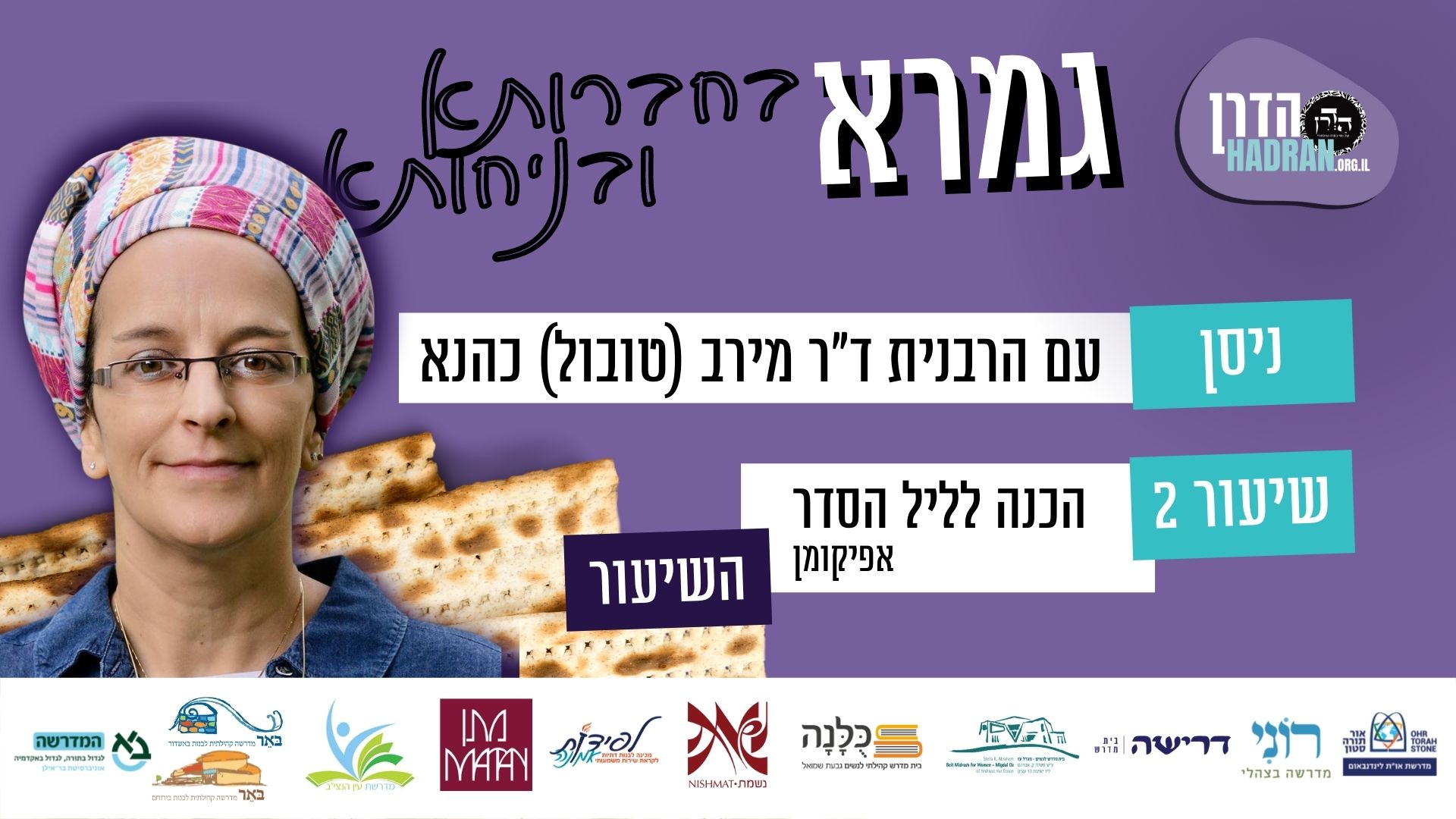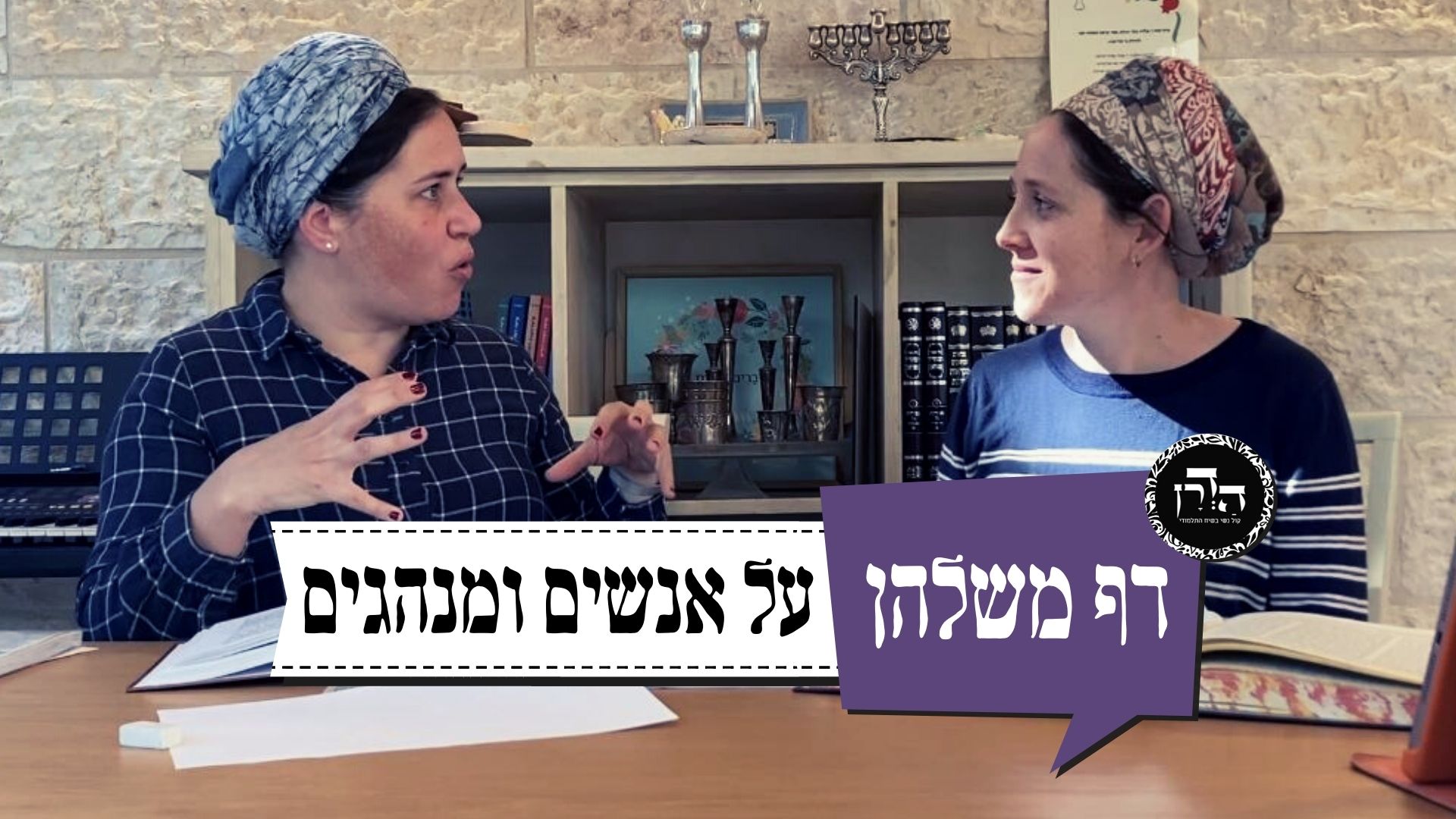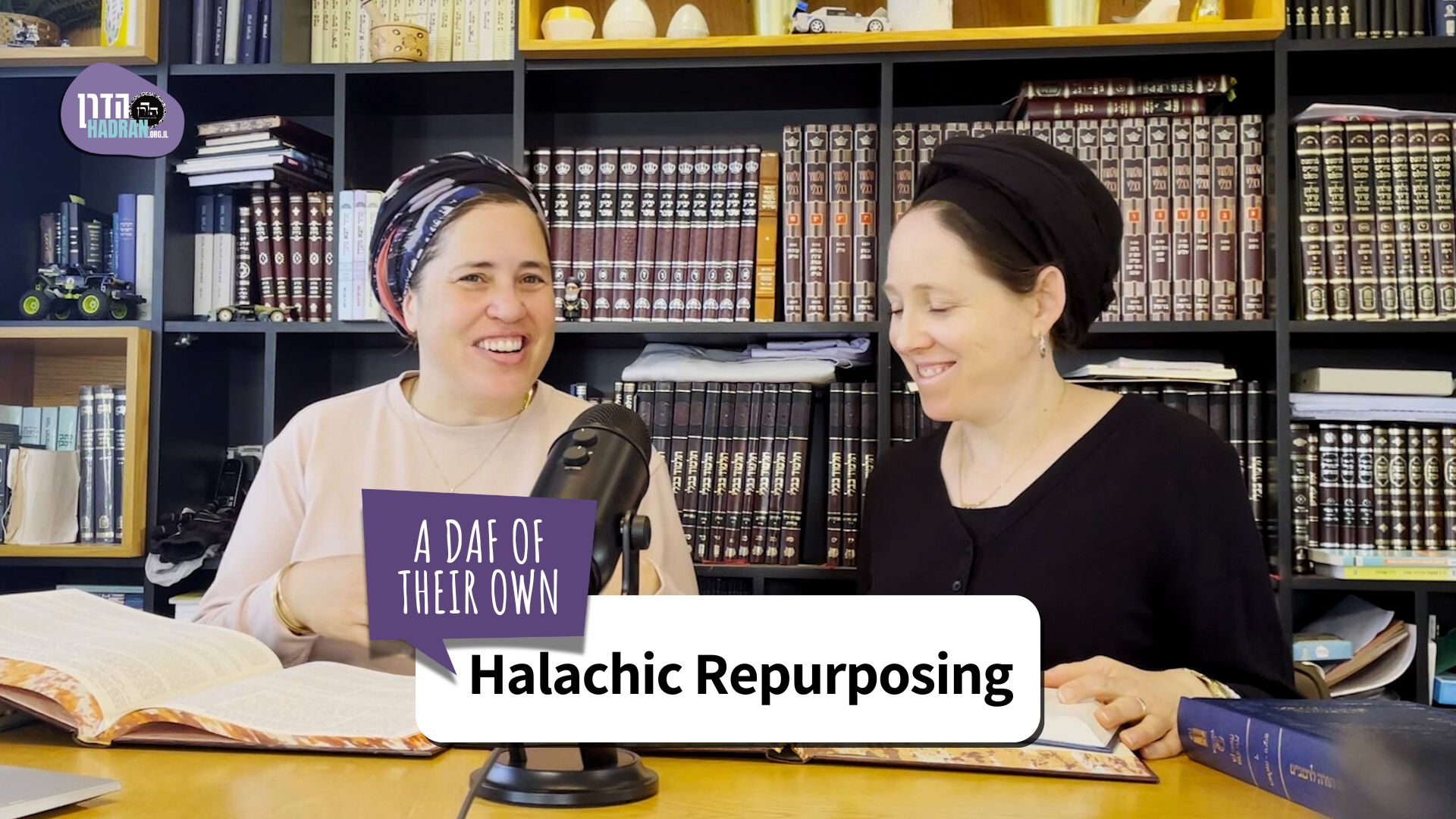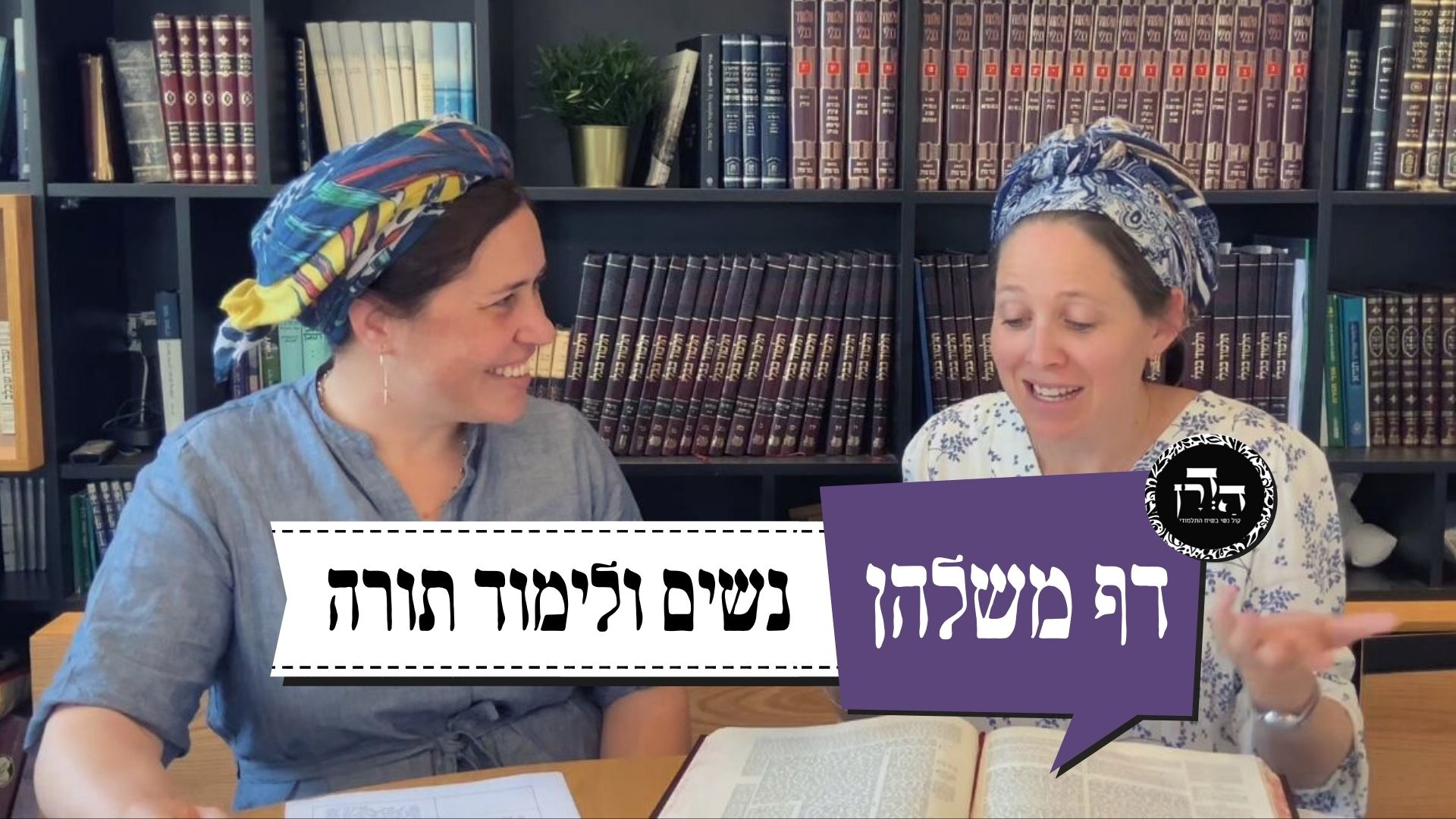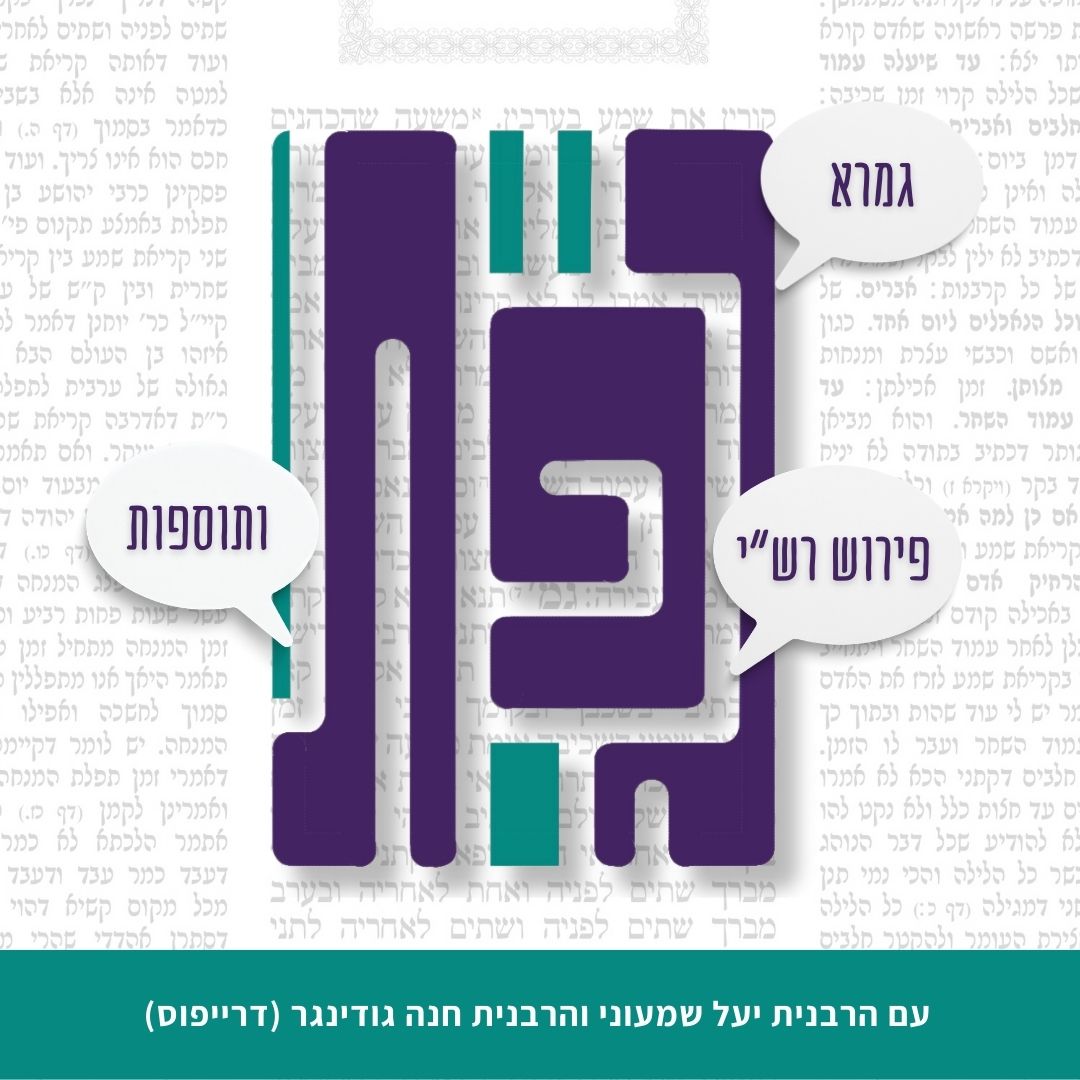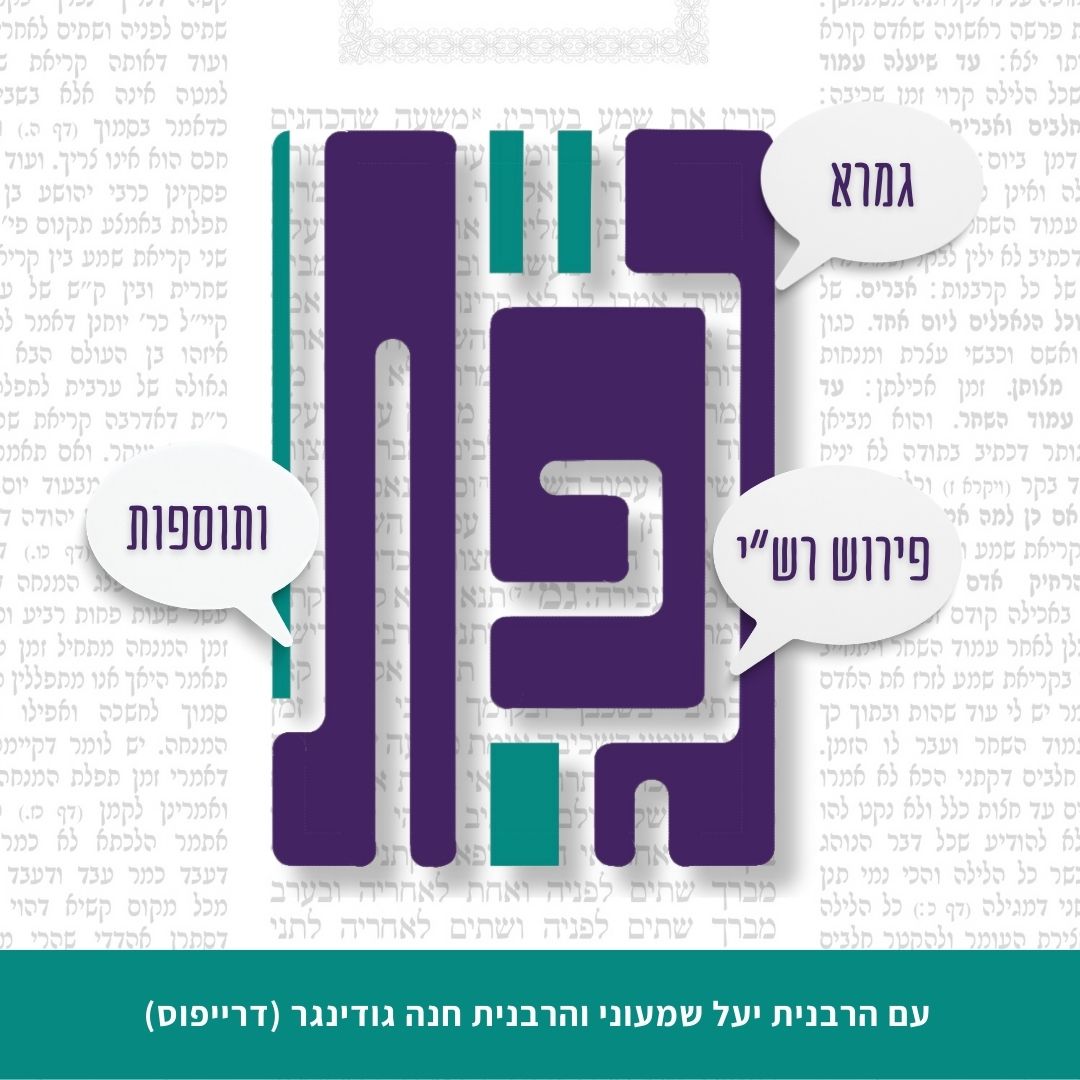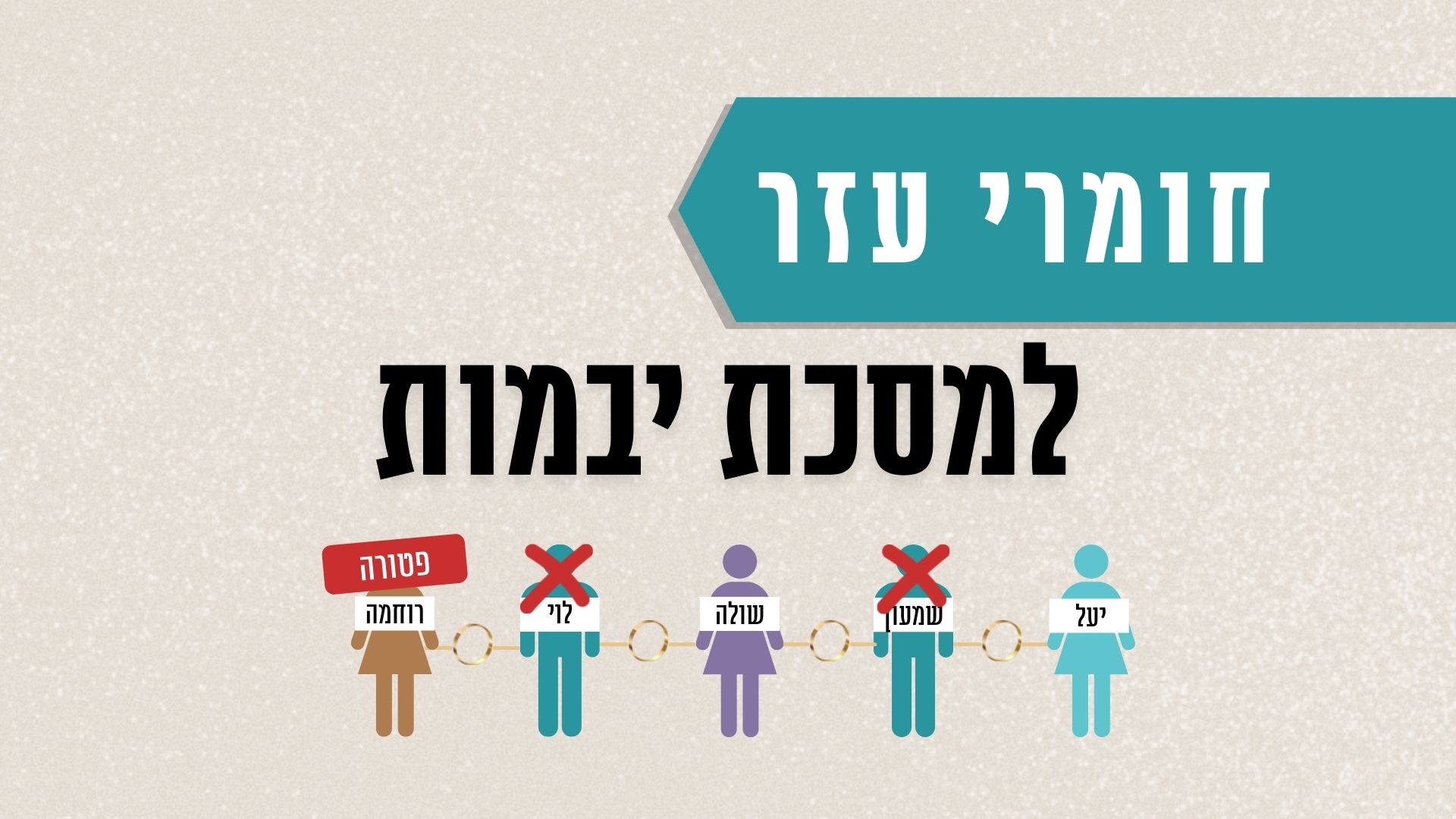מהו המקרה של מוקדשים שבו מישהו פטור משילוח הקן? ביאזה מקרים שייכת ובאיזה מקרים לא שייכת מצוות שילוח הקן? ואיך דורשים את זה מהפסוקים בתורה?
הלימוד החודש מוקדש לרפואת פיליס הכט, גיטל פעשא בת מאשה רחל על ידי חברותיה הרבות שאוהבות ומעריכות אותה.
רוצה להקדיש שיעור?

כלים
הלימוד החודש מוקדש לרפואת פיליס הכט, גיטל פעשא בת מאשה רחל על ידי חברותיה הרבות שאוהבות ומעריכות אותה.
כלים
העמקה
רוצה להבין מה באמת קורה מתחת לפני השטח של הסוגיה?
שיעורים, פודקאסטים והרחבות של מיטב המורות שלנו יפתחו לך עוד זוויות וכיווני חשיבה.
חדשה בלימוד הגמרא?
זה הדף הראשון שלך? איזו התרגשות עצומה! יש לנו בדיוק את התכנים והכלים שיעזרו לך לעשות את הצעדים הראשונים ללמידה בקצב וברמה שלך, כך תוכלי להרגיש בנוח גם בתוך הסוגיות המורכבות ומאתגרות.
פסיפס הלומדות שלנו
גלי את קהילת הלומדות שלנו, מגוון נשים, רקעים וסיפורים. כולן חלק מתנועה ומסע מרגש ועוצמתי.
חולין קלט
בר קטלא הוא אלא דלא גמר דיניה ובעי לאתוייה לבי דינא וקיומי ביה (דברים יג, ו) ובערת הרע מקרבך
how could it be free to rest on its eggs? It is subject to being killed and should have been executed. Rather, it must be a case where its verdict was not yet issued, and one is required to bring it to the court to fulfill through it the verse: “And you shall eradicate the evil from your midst” (Deuteronomy 13:6).
הני מוקדשין היכי דמי אילימא דהוה ליה קן בתוך ביתו ואקדשיה מי מיחייב (דברים כב, ו) כי יקרא קן צפור פרט למזומן
§ With regard to the statement of the mishna that sacrificial birds are not included in the mitzva of sending away the mother bird from the nest, the Gemara asks: What are the circumstances of these sacrificial birds discussed in the mishna? If we say that the mishna is referring to a case where one had a nest in his house and consecrated it, is one obligated to send away even a non-sacred bird in such a case? The verse states: “If a bird’s nest happens before you on the way” (Deuteronomy 22:6), which excludes a nest readily available in one’s home.
אלא דחזא קן בעלמא ואקדשיה ומי קדוש (ויקרא כז, יד) איש כי יקדיש את ביתו קדש אמר רחמנא מה ביתו ברשותו אף כל ברשותו
Rather, perhaps the mishna is referring to a case where one merely saw a nest that did not belong to him, and he consecrated it. But this, too, is problematic: Is the nest consecrated in such a case? But the Merciful One states: “When a man shall sanctify his house to be holy” (Leviticus 27:14), indicating that just as his house is in his possession when he consecrates it, so too, any item that one wishes to consecrate must be in his possession when consecrating it. If so, one cannot consecrate a nest that does not belong to him.
אלא דאגבהינהו לאפרוחים ואקדשינהו והדר הדרינהו האי אפילו בחולין נמי לא מיחייב דתנא נטל את הבנים והחזירן לקן ואח”כ חזרה האם עליהן פטור מלשלח
Rather, say that the mishna is referring to a case where one lifted the chicks, taking possession of them, and then consecrated them, and then returned them to the nest. But this too cannot be, as even with regard to non-sacred birds one is not obligated to send the mother away in such a case, as is taught in a mishna (141a): If one sent the mother away and took the offspring and then returned them to the nest, and thereafter, the mother returned and rested upon them, one is exempt from sending the mother bird away, because he has acquired the offspring and they are now considered readily available.
אלא דאגבהה לאם ואקדשה והדרה מעיקרא איחייב ליה בשילוח מקמי דאקדשה דתניא ר’ יוחנן בן יוסף אומר הקדיש חיה ואח”כ שחטה פטור מלכסות שחטה ואח”כ הקדישה חייב לכסות שכבר נתחייב בכסוי קודם שיבא לידי הקדש
The Gemara suggests: Rather, say that the mishna is referring to a case where one lifted the mother, taking possession of her, and then consecrated her, and thereafter returned her to the nest. The Gemara responds that this too cannot be, because he was initially obligated in the sending away of the mother bird before he consecrated her. Consequently, the consecration of the bird afterward cannot abrogate the requirement to send it away, as it is taught in a baraita: Rabbi Yoḥanan ben Yosef says: If one consecrated an undomesticated animal and then slaughtered it, he is exempt from covering its blood, because a consecrated animal is not subject to the obligation of covering the blood. But if he slaughtered it and then consecrated it, he is obligated to cover its blood, as he was already obligated in the mitzva of covering of the blood before it came into the possession of the Temple treasury.
רב אמר במקדיש פירות שובכו ומרדו ושמואל אמר במקדיש תרנגולתו לבדק הבית
Rather, Rav says: The mishna is referring to a case of one who consecrates the fruit, i.e., the chicks, of his dovecote for sacrifice on the altar, and they later rebelled and fled from the dovecote and nested elsewhere. The mishna teaches that although such birds are not considered readily available, one is exempt from sending away the mother because they are sacrificial birds. If they were non-sacred, one who finds them would be obligated to do so. And Shmuel says: The mishna is referring to a case of one who consecrates his chicken for Temple maintenance, and the chicken later rebelled and fled its owner’s home and established a nest elsewhere.
בשלמא שמואל לא אמר כרב דקא מוקים לה בקדשי בדק הבית אלא רב מאי טעמא לא אמר כשמואל
The Gemara objects: Granted, Shmuel did not state his explanation of the mishna in accordance with that of Rav, since he interprets it as referring even to birds consecrated for Temple maintenance, which do not have inherent sanctity. Accordingly, the mishna teaches that all consecrated birds are not included in the mitzva of sending away the mother bird. But what is the reason that Rav did not state his explanation in accordance with that of Shmuel?
אמר לך רב דוקא קפטרי משילוח כגון פירות שובכו דקדשי מזבח נינהו דכיון דקדשי קדושת הגוף לא פקעה קדושתייהו מינייהו אבל במקדיש תרנגולתו לבדק הבית דלאו קדשי מזבח דקדושת דמים בעלמא הוא כיון דמרדה פקעה קדושתייהו וחייבת בשילוח
The Gemara responds: Rav could have said to you: I specifically exempted one from sending the mother bird away in a case where the birds are the fruit of his dovecote, as they are consecrated for the altar. Since they are consecrated with inherent sanctity, their sanctity is not abrogated from them even when they flee from the dovecote. But in a case where one consecrates his chicken for Temple maintenance, where the chicken is not consecrated for the altar but merely has sanctity that inheres in its value, once it rebels its sanctity is abrogated, and it is obligated in, i.e., subject to, the mitzva of sending away the mother bird.
ושמואל אמר כל היכא דאיתיה בבי גזא דרחמנא איתא דכתיב (תהלים כד, א) לה’ הארץ ומלואה וכן אמר ר’ יוחנן במקדיש תרנגולתו לבדק הבית ומרדה אמר ליה רבי שמעון בן לקיש וכיון שמרדה פקעה ליה קדושתה אמר ליה בבי גזא דרחמנא איתא דכתיב לה’ הארץ ומלואה
And Shmuel could have said: Though it has rebelled, the chicken retains its sanctity, since wherever it is, it is in the treasury [bei gazza] of the Merciful One, as it is written: “The earth is the Lord’s, and its fullness thereof” (Psalms 24:1). And so Rabbi Yoḥanan says that the mishna is referring to a case where one consecrated his chicken for Temple maintenance, and the chicken then rebelled. Rabbi Shimon ben Lakish said to him: But once it rebels, its sanctity is abrogated. Rabbi Yoḥanan said to him: Wherever it is, it is in the treasury of the Merciful One, as it is written: “The earth is the Lord’s, and its fullness thereof.”
ורמי דר’ יוחנן אדר’ יוחנן ורמי דר’ שמעון בן לקיש אדר”ש בן לקיש
And the Gemara raises a contradiction between the statement of Rabbi Yoḥanan here and that of Rabbi Yoḥanan elsewhere, and the Gemara raises a contradiction between the statement of Rabbi Shimon ben Lakish here and that of Rabbi Shimon ben Lakish elsewhere.
דאיתמר מנה זה לבדק הבית ונגנבו או נאבדו רבי יוחנן אמר חייב באחריותן עד שיבואו לידי גזבר וריש לקיש אמר כל היכא דאיתיה בבי גזא דרחמנא איתיה דכתיב לה’ הארץ ומלואה קשיא דריש לקיש אדריש לקיש קשיא דר’ יוחנן אדר’ יוחנן
As it was stated: If one declares that these one hundred dinars are consecrated for Temple maintenance, and they were stolen or lost, Rabbi Yoḥanan says: He bears responsibility for them until they come into the physical possession of the Temple treasurer [gizbar]. Consequently, he must pay one hundred dinars to the treasury. And Reish Lakish says: One is not required to replace the lost money, since wherever it is, it is in the treasury of the Merciful One, as it is written: “The earth is the Lord’s, and its fullness.” Accordingly, the money is considered to have entered the possession of the treasury. If so, this statement of Reish Lakish poses a difficulty for the other statement of Reish Lakish, and this statement of Rabbi Yoḥanan poses a difficulty for the other statement of Rabbi Yoḥanan.
דריש לקיש אדריש לקיש לא קשיא הא מקמי דשמעיה מר’ יוחנן רביה הא לבתר דשמעיה מר’ יוחנן רביה
The Gemara responds: The apparent contradiction between this statement of Reish Lakish and that statement of Reish Lakish is not difficult. This statement, that the sanctity of a consecrated chicken that rebelled is abrogated, was made before he heard the statement from Rabbi Yoḥanan, his teacher, that wherever it is, it is in God’s treasury. That statement, that one is not liable to replace the missing consecrated funds, was made after he heard that statement from Rabbi Yoḥanan his teacher.
אלא דר’ יוחנן אדר’ יוחנן קשיא דר’ יוחנן אדר’ יוחנן נמי לא קשיא הא דאמר עלי הא דאמר הרי זו
The Gemara objects: But still, this statement of Rabbi Yoḥanan poses a difficulty for that statement of Rabbi Yoḥanan. The Gemara responds: The apparent contradiction between this statement of Rabbi Yoḥanan and that statement of Rabbi Yoḥanan is also not difficult. This statement, that one bears responsibility for the missing consecrated funds, is referring to a case where the consecrator said: It is incumbent upon me to bring one hundred dinars to the Temple treasury. In such a case, one bears responsibility for the money until it reaches the Temple treasurer. That statement, that a consecrated chicken that rebelled remains consecrated, is referring to a case where the consecrator said: This chicken is consecrated for Temple maintenance. In such a case, the sanctity is not abrogated even after the chicken flees, because wherever it is, it is in God’s treasury.
מכלל דר”ש בן לקיש אע”ג דאמר עלי לא מחייב
The Gemara objects: If it is so that when Rabbi Yoḥanan says that one bears financial responsibility for the missing consecrated funds, he is referring to a case where one said: It is incumbent upon me, by inference one may conclude that according to Rabbi Shimon ben Lakish, who says that one does not bear responsibility for the money, one does not bear financial responsibility even though one said: It is incumbent upon me.
והתניא איזהו נדר ואיזו היא נדבה נדר האומר הרי עלי עולה נדבה האומר הרי זו עולה ומה בין נדר לנדבה נדר מתה או נגנבה או שאבדה חייב באחריותה נדבה מתה או נגנבה או שאבדה אינו חייב באחריותה
But isn’t it taught in a mishna (Kinnim 1:1): Which is the case of a vow offering, and which is the case of a gift offering? A vow offering is where one says: It is incumbent upon me to bring a burnt offering. A gift offering is where one says: This animal is a burnt offering. And what is the difference between a vow offering and a gift offering? With regard to a vow offering, if it died or was stolen or lost, one bears financial responsibility for it. With regard to a gift offering, if it died or was stolen or lost, one does not bear financial responsibility for it.
אמר לך ריש לקיש הני מילי קדשי מזבח דמחוסר הקרבה אבל קדשי בדק הבית דלאו מחוסר הקרבה אע”ג דאמר עלי לא מחייב
The Gemara responds that Reish Lakish could have said to you: This statement, that one who says: It is incumbent upon me, bears financial responsibility, applies only to an item consecrated for the altar, since one vowed to sacrifice it as an offering and it has not yet been sacrificed. But with regard to an item consecrated for Temple maintenance, which is not lacking sacrifice on the altar, even though one said: It is incumbent upon me, one does not bear financial responsibility for it.
והתנן האומר שור זה עולה בית זה קרבן מת השור נפל הבית אינו חייב באחריותן שור זה עלי עולה בית זה עלי קרבן מת השור ונפל הבית חייב לשלם
The Gemara objects: But didn’t we learn in a mishna (Arakhin 20b) that in the case of one who says: This bull is consecrated as a burnt offering, or: This house is consecrated as an offering, and the bull died or the house collapsed, he does not bear financial responsibility for them; but in the case of one who says: It is incumbent upon me to give this bull as a burnt offering, or: It is incumbent upon me to give this house as an offering, if the bull died or the house collapsed, he is obligated to pay its value? Evidently, even with regard to items consecrated for Temple maintenance, if one says: It is incumbent upon me, one bears financial responsibility for them.
ה”מ היכא דמת השור ונפל הבית חייב לשלם דליתנהו אבל היכא דאיתנהו כל היכא דאיתיה בבי גזא דרחמנא איתיה דכתיב לה’ הארץ ומלואה
The Gemara responds: With regard to this statement, that if one says: It is incumbent upon me to give an item for Temple maintenance, he bears financial responsibility, that applies only where the bull died or the house collapsed. In such a case he is obligated to pay, since they no longer exist. But where they still exist, e.g., in the case of an item or sum of money that was lost or stolen, one applies the principle: Wherever it is, it is in the treasury of the Merciful One, as it is written: “The earth is the Lord’s, and its fullness thereof.”
אמר רב המנונא הכל מודים בערכין אע”ג דאמר עלי לא מיחייב מאי טעמא דלא מיתמר ליה בלא עלי
§ The Gemara above cited a dispute between Rabbi Yoḥanan and Reish Lakish as to the halakha about one who says: It is incumbent upon me to bring an item for Temple maintenance. With regard to this dispute, Rav Hamnuna says: Everyone concedes with regard to valuations that even if one said: It is incumbent upon me to donate my own valuation, and one set aside money that was then lost or stolen, one does not bear financial responsibility for it. What is the reason for this? It is because it cannot be stated by him without stating: Upon me. In other words, one cannot say: This is my valuation, since he has yet to accept upon himself any such obligation.
היכי לימא לימא ערכי אמאן לימא ערך פלוני אמאן
Therefore, although one says: It is incumbent upon me to donate my valuation, this is not considered an acceptance of financial responsibility. After all, how shall he say it without stating: It is incumbent upon me? Shall he say only: My own valuation, without: Is incumbent upon me? If so, upon whom is the obligation placed to pay the money? Or shall he say only: The valuation of so-and-so? Still, upon whom is the obligation placed to pay the money?
מתקיף לה רבא לימא הריני בערכי הריני בערך פלוני ועוד תניא רבי נתן אומר (ויקרא כז, כג) ונתן את הערכך ביום ההוא קדש לה’ מה תלמוד לומר לפי שמצינו בהקדשות ומעשרות שמתחללין על מעות שבחולין נגנבו או שאבדו אינן חייבין באחריותן
Rava objects to this: Let him say: I am encumbered with my own valuation, or: I am encumbered with the valuation of so-and-so. One need not say: Is incumbent upon me. Additionally, it is taught in a baraita with regard to the redemption of a purchased field that was consecrated that Rabbi Natan says about the verse: “Then the priest shall reckon for him the worth of your valuation until the Jubilee Year, and he shall give your valuation on that day, as a consecrated thing to the Lord” (Leviticus 27:23): Why must the verse state: “And he shall give your valuation”? It could have stated simply: And he shall give it. It is necessary because we have found with regard to consecrated property and tithes that they can be desacralized by transferring their sanctity onto non-sacred money, and that if that money was stolen or lost, the owners do not bear financial responsibility for it.
יכול אף זה כן ת”ל ונתן את הערכך וגו’ חולין עד שיבאו לידי גזבר
One might have thought that with regard to this valuation too, the halakha should be so, i.e., if money from a valuation is stolen or lost, the owner does not bear financial responsibility for it. Therefore, the verse states: “And he shall give your valuation on that day,” indicating that the valuation money is non-sacred until it enters the possession of the Temple treasurer, and that the owner bears responsibility for it until that time. Evidently, even with regard to valuations, the consecrator bears financial responsibility, in contradiction to the statement of Rav Hamnuna.
אלא אי איתמר הכי איתמר אמר רב המנונא הכל מודים בערכין דאע”ג דלא אמר עלי מיחייב דכתיב (ויקרא כז, כג) ונתן את הערכך חולין הן בידך עד שיבאו לידי גזבר:
Rather, if a statement was stated, this is what was stated: Rav Hamnuna says that everyone concedes with regard to valuations that even if one did not say: It is incumbent upon me, one bears financial responsibility for it, as it is written: “And he shall give your valuation,” indicating that the valuation money is non-sacred until it enters the possession of the Temple treasurer.
חומר בכסוי וכו’: תנו רבנן (דברים כב, ו) כי יקרא קן צפור לפניך מה ת”ל
§ The mishna states: There are more stringent elements in the covering of the blood than in the sending away of the mother from the nest, as the covering of the blood applies to undomesticated animals and birds, to animals and birds that are readily available in one’s home, and to animals and birds that are not readily available; and the sending of the mother from the nest applies only to birds that are not readily available. With regard to the mitzva of sending away the mother, the Sages taught in a baraita: The verse states: “If a bird’s nest happens before you on the way, in any tree or on the ground, with fledglings or eggs, and the mother is resting upon the fledglings, or upon the eggs, you shall not take the mother with the young; you shall send the mother, but the young you may take for yourself” (Deuteronomy 22:6–7). What is the meaning when the verse states all the various details contained in it?
לפי שנאמר (דברים כב, ז) שלח תשלח את האם ואת הבנים תקח לך יכול יחזור בהרים וגבעות כדי שימצא קן ת”ל כי יקרא במאורע לפניך
Since it is stated: “You shall send [shalle’aḥ teshallaḥ] the mother, but the young you may take for yourself,” one might have thought that the doubled verb “shalle’aḥ teshallaḥ” indicates that one must search even in the mountains and hills in order to find a nest with which to perform this mitzva. Therefore, the verse states: “If a bird’s nest happens,” indicating that one is obligated to send away the mother only when it confronts you; one is not required to seek out a nest.
קן מ”מ צפור טהורה ולא טמאה לפניך ברשות היחיד בדרך ברשות הרבים באילנות מנין ת”ל בכל עץ בבורות שיחין ומערות מנין ת”ל או על הארץ
The baraita continues: The word “nest” indicates that this mitzva applies in any case, even to a nest with only a single chick or egg. The word “bird’s” indicates that the mitzva applies only to kosher birds, and not to non-kosher birds. The term “before you” indicates that the mitzva applies to a nest that is on private property, e.g., an unguarded orchard or field, such that the owner’s property does not acquire the nest for him. The term “on the way” indicates that the mitzva also applies to a nest found in a public thoroughfare. From where is it derived that the mitzva also applies to nests found in trees? The verse states: “In any tree.” And with regard to nests found in pits, ditches, and caves, from where is it derived that the mitzva also applies to them? The verse states: “Or on the ground,” indicating that the mitzva applies to a nest on any type of ground.
וכי מאחר שסופנו לרבות כל דבר לפניך בדרך למה לי לומר לך מה דרך שאין קנו בידך אף כל שאין קנו בידך מכאן אמרו יוני שובך ויוני עלייה שקננו בטפיחין ובבירות ואווזין ותרנגולין שקננו בפרדס חייב בשילוח אבל קננו בתוך הבית וכן יוני הרדסיאות פטור משילוח
The baraita continues: And since, in the end, we will include everything, i.e., every location of the nest, from the verse: “In any tree or on the ground,” why do I need the earlier statement: “Before you on the way”? It is to say to you: Just as a nest on the way is a case in which the bird’s nest is not in your possession and is not readily available for you, so too, with regard to all other cases, one is obligated only when its nest is not in your possession. From here the Sages stated: With regard to pigeons of a dovecote or pigeons of an attic that nested in small wall niches or in buildings, and geese or chickens that nested in an orchard, one is obligated in the mitzva of sending the mother bird away, because such birds are not in one’s possession. But with regard to birds that nested inside the house, and likewise with regard to domesticated pigeons, one is exempt from the mitzva of sending the mother bird away.
אמר מר מה דרך שאין קנו בידך אף כל שאין קנו בידך הא למה לי מכי יקרא נפקא כי יקרא פרט למזומן ועוד לפניך למה לי
§ The Gemara analyzes the above baraita: The Master said: Just as a nest on the way is a case in which the bird’s nest is not in your possession, so too, with regard to all other cases, one is obligated only when its nest is not in your possession. The Gemara asks: Why do I need this derivation? It may be derived from: “If a bird’s nest happens,” as it is taught: “If a bird’s nest happens” excludes a nest that is readily available. And furthermore, why do I need the term “before you” to include even a nest found on private property? It is already derived from the verse: “In any tree or on the ground.”
אלא לפניך לאתויי שהיו לפניך ומרדו בדרך כדרב יהודה אמר רב דאמר רב יהודה אמר רב מצא קן בים חייב בשילוח שנאמר (ישעיהו מג, טז) כה אמר ה’ הנותן בים דרך וגו’
Rather, the term “before you” is necessary to include a case where the birds were before you, i.e., they had an owner and were readily available to him, and they then rebelled and fled and nested elsewhere. “On the way” is necessary for that which Rav Yehuda said that Rav said, as Rav Yehuda said that Rav said: If one found a nest in the sea, e.g., in a case where a tree was washed out to sea with a nest in its branches, one is obligated in the mitzva of sending the mother bird away, as it is stated: “So said the Lord, who makes a way in the sea, and a path in the mighty waters” (Isaiah 43:16). The term “way” applies even to the sea.
אלא מעתה מצא קן בשמים דכתיב (משלי ל, יט) דרך נשר בשמים הכי נמי דמיחייב בשילוח הקן דרך נשר איקרי דרך סתמא לא איקרי
The Gemara challenges: If that is so, then if one found a nest in the sky, e.g., in a case where a bird carries the nest as it flies, about which it is written: “The way of an eagle in the sky” (Proverbs 30:19), one should also be obligated in the mitzva of sending away the mother bird from the nest. The Gemara responds: The sky is called “the way of an eagle,” but it is not called: A way, in an unspecified manner. The sea, by contrast, is referred to simply as: A way.
אמרי ליה פפונאי לרב מתנה מצא קן בראשו של אדם מהו אמר (שמואל ב טו, לב) ואדמה על ראשו משה מן התורה מנין (בראשית ו, ג) בשגם הוא בשר
§ The residents of Pappunya said to Rav Mattana: If one found a nest on the head of a person, what is the halakha with regard to the mitzva of sending away the mother? Is the nest considered to be on the ground, such that one is obligated in the mitzva? Rav Mattana said to them that one is obligated in the mitzva in such a case because the verse states: “And earth upon his head” (II Samuel 15:32), rather than: Dirt upon his head, indicating that one’s head is considered like the ground. They also asked Rav Mattana: From where in the Torah is the existence of Moses [Moshe] alluded to before his birth? He replied that the verse states: “For that he also [beshaggam] is flesh; therefore shall his days be one hundred and twenty years” (Genesis 6:3). The numerical value of beshaggam is the same as that of the Hebrew name Moshe, and it is known that Moses lived a total of 120 years (see Deuteronomy 34:7).
המן מן התורה מנין (בראשית ג, יא) המן העץ
They also asked Rav Mattana: From where in the Torah can one find an allusion to the hanging of Haman? He replied: The verse states after Adam ate from the tree of knowledge: “Have you eaten of [hamin] the tree, about which I commanded you that you should not eat?” (Genesis 3:11). Hamin is spelled in the same manner as Haman: Heh, mem, nun.
אסתר מן התורה מנין (דברים לא, יח) ואנכי הסתר אסתיר מרדכי מן התורה מנין דכתיב (שמות ל, כג) מר דרור ומתרגמינן מירא דכיא:
They also asked Rav Mattana: From where in the Torah can one find an allusion to the events involving Esther? He replied to them that the verse states: “Then My anger shall be kindled against them on that day, and I will forsake them, and I will hide My face from them, and they shall be devoured, and many evils and troubles shall come upon them; so that they will say in that day: Have not these evils come upon us because our God is not among us? And I will hide [haster astir] My face on that day for all the evil which they shall have wrought, in that they are turned to other gods” (Deuteronomy 31:17–18). They also asked him: From where in the Torah can one find an allusion to the greatness bestowed upon Mordecai? He replied: As it is written with regard to the anointing oil in the Tabernacle: “And you shall also take the chief spices, of flowing myrrh [mor deror]” (Exodus 30:23); and we translate mor deror into Aramaic as: Mira dakhya, which resembles the name Mordecai.
ואיזהו שאינו מזומן וכו’: ר’ חייא ור’ שמעון חד תני הדרסיאות וחד תני הרדסיאות מאן דתני הרדסיאות על שם הורדוס ומאן דתני הדרסיאות על שם מקומן
§ The mishna states: And which are considered birds that are not readily available? They are any birds such as geese or chickens that nested in the orchard. But if the geese or chickens nested in the house, one is exempt from sending them away, and likewise with regard to domesticated pigeons. The Gemara relates: With regard to the correct name of the domesticated pigeons referred to in the mishna, Rabbi Ḥiyya and Rabbi Shimon disagree. One teaches that the correct name is yonei hadrisei’ot, and the other one teaches that the correct name is yonei hardisei’ot. According to the one who teaches that the correct name is yonei hardisei’ot, they are called so on account of King Herod, who was involved in breeding these pigeons; and according to the one who teaches that the correct name is yonei hadrisei’ot, they are called so on account of their location.
אמר רב כהנא לדידי חזיין וקיימן שיתסר דרי בפתי מילא והוה קרא קירי קירי הוה חד מינייהו דלא הוה קרי קירי קירי אמרה לה חברתה סומא אמרי קירי קירי אמרה סומא אמרי קירי בירי אתיוה ושחטוה
Rav Kahana said: I myself saw these pigeons, and they were standing in sixteen rows, each a mil wide, and they were calling out: My master, my master. There was one of them who was not calling out: My master, my master. Another one said to it: Blind one, i.e., fool, say: My master, my master, so that you will not be punished for refusing to acknowledge the authority of the king. The pigeon said in response: Blind one, you should say: My master, my slave, as Herod is not a king but a slave. They brought that pigeon to a slaughterhouse and slaughtered it for speaking against the king.
א”ר אשי אמר לי [ר’] חנינא מילין מילין ס”ד אלא אימא במילין:
Rav Ashi said: Rabbi Ḥanina said to me: This story is no more than mere words, as no such incident took place. The Gemara asks: Can it enter your mind that Rabbi Ḥanina dismisses as mere words an incident reported by Rav Kahana? Rather, say that Rabbi Ḥanina said that those pigeons acted as described above through words of witchcraft.
עוף טמא פטור מלשלח: מנה”מ א”ר יצחק דאמר קרא כי יקרא קן צפור לפניך עוף משמע לן בין טהור בין טמא צפור טהור אשכחן דאיקרי צפור טמא לא אשכחן דאיקרי צפור
§ The mishna states: If one encounters a nest of a non-kosher bird, one is exempt from sending away the mother bird. The Gemara asks: From where is this matter derived? Rabbi Yitzḥak said: As the verse states: “If a bird’s [tzippor] nest happens before you” (Deuteronomy 22:6), and not: If a bird’s [of ] nest happens before you. The word of indicates to us that all birds are included, whether kosher or non-kosher. But with regard to the word tzippor, we have found that a kosher bird is called a tzippor, but we have not found that a non-kosher bird is called a tzippor.
תא שמע (דברים ד, יז) תבנית כל צפור כנף מאי לאו צפור בין טהור בין טמא כנף חגבים לא צפור טהור כנף טמא וחגבים
The Gemara attempts to reject the above assertion: Come and hear that which is stated in the verse with regard to the prohibition against fashioning idols: “The likeness of any winged bird [tzippor]” (Deuteronomy 4:17). What, is it not that the word “tzippor” is referring to any bird, whether kosher or non-kosher, and the word “winged” adds the likeness of grasshoppers to the prohibition? If so, we have found that a non-kosher bird is called a tzippor. The Gemara rejects this: No, the word “tzippor” means a kosher bird, while the word “winged” is referring to non-kosher birds and to grasshoppers.
ת”ש (תהלים קמח, י) החיה וכל בהמה רמש וצפור כנף מאי לאו צפור בין טהור בין טמא וכנף חגבים לא צפור טהור כנף טמא וחגבים
The Gemara suggests: Come and hear that which is stated in the passage describing how all of creation praises God: “The undomesticated animal and all domesticated animals, creeping things and winged birds [tzippor]” (Psalms 148:10). What, is it not that the word “tzippor” is referring to all birds, whether kosher or non-kosher, and the word “winged” is referring to grasshoppers? The Gemara rejects this: No, the word “tzippor” means a kosher bird, while the word “winged” is referring to non-kosher birds and to grasshoppers.
תא שמע (בראשית ז, יד) כל צפור כל כנף מאי לאו כדמקשינן לא כדמשנינן
The Gemara suggests: Come and hear that which is stated in the verse about the animals that entered Noah’s ark: “Every bird [tzippor] of every type of wing” (Genesis 7:14). What, is it not the same difficulty that we posed previously, that the word “tzippor” is referring to all birds, kosher and non-kosher, and the word “wing” is referring to grasshoppers? The Gemara rejects this as well: No, it is actually as we resolved it, that the word “tzippor” is referring only to kosher birds, and the word “wing” is referring to non-kosher birds and to grasshoppers.
תא שמע (יחזקאל לט, א) ואתה בן אדם אמור לצפור כל כנף מאי לאו כדאקשינן לא כדשנינן
The Gemara suggests: Come and hear that which is stated in the passage describing the war of Gog and Magog: “And you, son of man, so said the Lord God: Speak to the birds [tzippor] of every type of wing, and to every animal of the field: Assemble yourselves, and come” (Ezekiel 39:17). What, is it not the same difficulty that we posed previously? The Gemara responds: No, it is actually as we resolved it.
ת”ש
The Gemara suggests: Come and hear that which is

